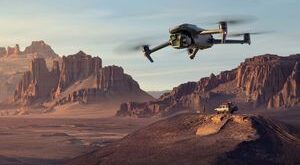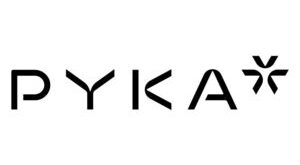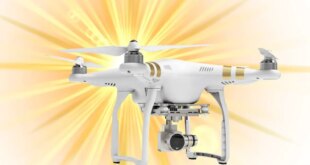On a remote island of the South Pacific country of Vanuatu,
one-month-old Joy Nowai became the world’s first child to
be given a vaccine delivered commercially by drone.
The
vaccine delivery covered almost 40 kilometres of rugged
mountainous terrain from Dillon’s Bay on the west side of
the island to the east landing in remote Cook’s Bay, where
13 children and five pregnant women were vaccinated by
Miriam Nampil, a registered nurse. Cook’s Bay, a small,
scattered community that does not have a health centre or
electricity, is only accessible by foot or small local
boats.
“Today’s small flight by drone is a big leap
for global health,” said Henrietta H. Fore, UNICEF
Executive Director. “With the world still struggling to
immunise the hardest to reach children, drone technologies
can be a game changer for bridging that last mile to reach
every child.”
Vaccines are difficult to transport as
they need to be carried at specific temperatures. Warm
weather locations like Vanuatu, which is made up of more
than 80 remote, mountainous islands stretching across 1,300
kilometres and with limited roads, is a particularly
difficult location for vaccine delivery. As a result, almost
20 per cent of the country’s children – or 1 in 5 –
miss out on their essential childhood vaccines.
“It’s
extremely hard to carry ice boxes to keep the vaccines cool
while walking across rivers, mountains, through the rain,
across rocky ledges. I’ve relied on boats, which often get
cancelled due to bad weather,” said Miriam Nampil, the
nurse who injected the world’s first drone-delivered
vaccine. ”As the journey is often long and difficult, I
can only go there once a month to vaccinate children. But
now, with these drones, we can hope to reach many more
children in the remotest areas of the island.”
During
the drone flight on Erromango, the vaccines were carried in
Styrofoam boxes with icepacks with a temperature logger. An
electronic indicator is triggered if the temperature of the
vaccines swings out of acceptable range.
In tests last
week, the Ministry of Health, with support from UNICEF,
conducted drone trials with two drone operators, Swoop Aero
and WingCopter, using test payloads. Swoop Aero, the
Australian company responsible for today’s successful
drone delivery, passed the first phase of trials by landing
the payloads within 2 meters of the target after a 50-km
flight over numerous islands and way points.
This is also
the first time globally that a government is contracting a
commercial drone company to transport vaccines to remote
areas. The drone operators are selected after a bidding
process, and as per the contract, they are held accountable
and not paid if they don’t deliver.
In the long term,
the Government of Vanuatu is interested in integrating the
drone delivery of vaccines into their national immunisation
programme and using drones more widely to distribute health
supplies. The data from the trials will also be used to show
how drones can be used commercially in similar settings
around the world.
“Today’s first-of-a-kind vaccine
delivery has enormous potential not only for Vanuatu, but
also for the thousands of children who are missing out on
vaccines across the world,” added Fore. “This is
innovation at its best, and shows how we can unlock the
potential of the private sector for the greater good of the
world’s children.”
© Scoop Media
 Unmanned Aerial Vehicle The latest drone news
Unmanned Aerial Vehicle The latest drone news




